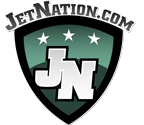Featured Editorials Home Slider NY Jets Training Camp Player interviews
Glenn Naughton Sits Down With Former Jet Marvin Wasington

The late 80’s and 90’s were a difficult time for the New York Jets and their fans. From 1989-1996 the Jets averaged just five wins per season. They never finished over .500 and managed to reach that mark only twice when they posted 8-8 records in 1991 and 1993. That stretch yielded only one playoff appearance, a wild-card loss to the Houston Oilers, and also featured a forgettable 1-15 mark in 1996.
Despite the poor on-field results, the Jets did have some very talented young players, especially on defense, who played through that rough period. One of those players was defensive end Marvin Washington.
In part II of our exclusive three-part interview, Marvin Washington talks to JetNation.com’s Glenn Naughton and discusses the highs and lows of his ten-year NFL career and offers an inside look in to some of the years that were tough to endure, for fans and players alike.
Glenn Naughton: Thanks again for taking the time to talk with JetNation.com Marvin. Our fans really appreciate it.
Marvin Washington: No problem, it’s my pleasure.
GN: So Marvin, you were drafted in the sixth round of the 1989 draft out of the university of Idaho. Do you remember who called you to give you the news and what that was like?
MW: It was Mike Hickey, he was the director of college scouting at the time, and if you recall, the draft was twelve rounds back then. They used to do rounds one through six on the first day, and then seven through twelve on the second day. So I waited that whole day and they cut it off after the fifth round. So, when the Jets made the choice I was actually in bed in Idaho because of the time difference. When I was picked it was only around 7 am so that was my wake-up call that day.
GN: How do you view the draft now as opposed to what it was like when you were selected?
MW: Oh, it’s big time now. Plus they’re taking it on the road, you have guys getting taken in the second round that get invited to the draft. Back then it was only the first rounder’s and the top guys.
GN: When you came to New York after the draft, had you ever been to the city prior to that or was that your first visit?
MW: Actually, my first trip to New York was when the Jets used to hold their own little combine. So it was me and about a hundred other players in March. We stayed in a hotel near La Guardia, we had dinner, and the next morning we went to the facility to meet the coaches and have our physicals done. I honestly didn’t think I was a guy that was on their radar but it worked out well because when they drafted me, I was familiar with some of their staff and the facilities.
GN: What was your first impression of the city?
MW: Oh, it was great because I grew up as a basketball guy, so having read all the stories about Lew Alcindor and some of the places I read about and wanted to visit, I got to see them and do that. It was great to see all these places I’d read about. It’s the greatest city in the world in my mind.
GN: So after the Jets draft you, you’re behind Jeff Lageman, Paul Frase, and Ron Stallworth, but you do get mixed in a little bit and make some plays. Year three is your first opportunity to start when you started fifteen games at defensive end. Do you think it was beneficial to you to get worked in slowly behind the veterans, or as a competitor did you feel like you should have been out there from day one?
MW: No, I don’t think I was ready to start from day one. If you look at my background I was a basketball player. I only played one year of college football at the I-AA level and then got drafted with the Jets. So, the game really didn’t slow down for me until my third year. You can imagine in my rookie year, I’m standing there and just two years earlier I was a basketball player. So, I think the Jets knew I was developmental and I’m happy with where I was drafted because if I had been drafted higher, there may have been a lot more pressure on me. Also, on the defensive line, you’re always keeping guys fresh and rotating. It was fine that they didn’t do it much in my first year, but in my second year I might have played as much as the starters did just because of the rotation. When Pete Carroll and Greg Robinson and those guys came in, one of the first things they stressed was that everybody was going to play and they were going to keep us rolling in there and keep you guys fresh. I’d go from a break, to left end, then right end, then a break. So we’d get two series on and one series off.
GN: I’m glad you mentioned Pete Carroll because that was my next question. What was it like playing for him as a young defensive coordinator who was considered, by a lot of people to be somewhat of a prodigy that unfortunately didn’t work out as the Head Coach?
MW: Pete is the same guy. When you talked to people at USC they talked about Pete has a high energy guy who is very smart and very knowledgeable about defenses, and that’s the same Pete that walked in to the room in 1990. He’s very high energy, very smart, very fair, and he emphasizes high energy and positive re-enforcement. That’s how he was with us, and even though we didn’t win a lot of games, I know we had one of the better defenses in the AFC for his tenure, and a couple of times we had one of the better defenses in the NFL. He always put you in a position to succeed and always made sure that you were prepared. There was nothing the offense threw at you that you didn’t see during the week on film. I have a lot of respect for Pete as a football coach and as a person. I’m sorry it didn’t work out for him as Head Coach of the Jets, but I don’t think he would change it because he probably wouldn’t be in the position he’s in now, and I enjoyed my time playing for Pete Carroll.
GN: It was under Pete that you had your first season as a starter and you guys made the playoffs. What was that week of practice like when you’re a defensive player getting ready to face the Oilers with the great Warren Moon at quarterback?
MW: I remember being in the playoffs, it was like all the noise in the NFL had stopped and it was just the playoff teams. We had to go down to Houston and face the run-and-shoot and we’d played them before. I thought we could beat them and I knew we could stop them on defense which we did. I think our offense had two or three shots inside the ten yard line and we didn’t get it in. I believe we lost that game 17-10.
GN: If you remember, at the end of that game, you guys had a chance to tie it and you were driving down the field when Ken O’ Brien hit Mark Boyer with a few seconds left on the clock. The next move was going to be, get on the ball and spike it to try a hail mary, but CB Chris Dishman was laying on top of Boyer and wouldn’t let him up. He probably held him on the ground for about five seconds and you guys weren’t able to get the snap off.
MW: Yes, I remember that play and that’s a tough way to end it.
GN: All things considered though, your defense had a great performance against a legendary quarterback in Warren Moon. Speaking of great players and looking back over your career, who were some of the best offensive linemen went up against?
MW: Well, within the division there was Richmond Webb. Once he came in to the league he was really good. Pat Harlow was tough, but the best guy I ever faced and everybody knows, was Anthony Munoz. He was the most fundamentally sound, and physical guy I have ever played against. He’s one of those guys who you could plug in and no matter what era, he could play. He lived up to the hype, a lot of guys didn’t, but he did. He was an outstanding, outstanding player.
GN: What about on your side of the ball? I know that as a defensive player, when you guys come off the field you’re game-planning and talking about what you’re seeing from the opposing offense, but what player did you want to see up close? Who would you play against that would make you take the time to seek them out when you weren’t on the field?
MW: Of course when I first came in to the league there were the guys you heard about. I remember practicing with the Giants at Lehigh, and it was like everybody stopped what they were doing to watch Lawrence Taylor when he came out for his one-on-one’s. He was everything everybody said he was. In the AFC, I loved watching Bruce Smith work his craft. He was devastating.
GN: What about a defensive unit? What team stood out to you in person?
MW: One defense that I really wanted to watch was the Cowboys in ’93. Their defense was under-sized and the quickest and most physical defense I’d ever seen until last year’s Seahawks. I remember we played them and the final was 28-7, but 21 of their points came off turnovers. We held Emmit Smith under 100 yards, we sacked Aikman a couple times and intercepted him, but that defense was the best I’d ever seen.
GN: After closing out your career with the Jets, you headed to San Francisco for one season, and then to Denver. In your time with the Jets, you guys averaged five wins per season, then you go to back-to-back conference championships with SF and Denver. What was that like?
MW: I think that was the NFL gods saying I’d put my time in, and I got to move on to two of the more storied franchises in the history of the NFL. In that first year with San Francisco, we lost the conference championship game, then with the Broncos, we obviously won the Super Bowl and beat the Jets in the championship game which was bittersweet. I knew a lot of those guys had put in so much work, and really felt like the next year, the Jets were gonna’ be in the Super Bowl.
GN: In playing for those two franchises, how different is it to go from the struggling offenses you had with the Jets, to playing with Steve Young as your quarterback one year, and John Elway the next? Does facing those guys every week make a better player or slow the game down a little bit?
MW: Well, being with them was like being in a different league. You had the national games, the Monday night games and not the obligatory once a year because of the big market. Always in the national spotlight. Playing with those guys gave you such an appreciation for how good they were and how they prepared.
GN: You talked about that AFC championship game against the Jets, and we recently spoke with Chad Cascadden about that game (http://www.jetnation.com/2014/08/25/former-jet-chad-cascadden-interview/) and he talked about that game in great detail but I was wondering how much interaction there was between you and your former teammates leading up to that game. Was there any communication?
MW: Well, I spoke to Marvin Jones a little bit, but I knew it was going to be a tough game. We were facing a Parcells and Belichick defense so it wasn’t going to be easy. I remember being down at the half being nervous. I was thinking they were gonna’ go to the Super Bowl and I’m not. Then in the second half we got some momentum going our way and we got that kickoff that blew back our way. One of the things we went in to that game thinking was that if we drop nine guys in to coverage, that Vinny (Testeverde) would give it to us because that was always the book on him, and he did.
GN: That was one of the best teams the Jets ever put together and they came up short, but how do you feel about the team as of today and their chances of doing something special?
MW: I follow the Jets very closely and they’re near and dear to me. They’re my favorite team, they’re my son’s favorite team and I do think that Rex is the right man for the job. I think both coaches in New York are coaching for their jobs but that’s just the nature of the NFL. I think the Jets have a championship defense once they get healthy at corner. If Geno Smith can take care of the ball, I think the offensive line is good, I think the running game is a strength and the passing game will be improved. I think they have a chance to make some noise in the AFC East. They have to stay healthy, and they have to take care of the ball. If they do those two things, the Jets have a chance to make a run at it. I think that front-7 is one of the best in the league and if Geno doesn’t take care of the ball, you have a guy who can come in for him. I’m very optimistic about the Jets and their chances and they surprised everybody when they won eight games last year, so what’s the next step? The next step is get better and go further and I believe they can do that.
GN: You mentioned your son Evan being a Jets fan, he’s playing on the offensive line at LSU right now, how’s he doing down there?
MW: It’s going good. He’s graduating this year and working on his masters. He’s rotating in on the offensive line and having a good, solid college career and getting his education, which to me is the most important thing to me. He a great kid, never gave us any trouble and he’s going to be successful in whatever he chooses to do.
This concludes part II of our three-part interview with former Jets defensive end Marvin Washington. In part III we’ll talk about the life-altering injury suffered by teammate Dennis Byrd when he was paralyzed during an on-field collision with teammate Scott Mersereau.
Videos
News and Notes from First Two Days of Jets Training Camp









